|
|
|
Sort Order |
|
|
|
Items / Page
|
|
|
|
|
|
|
| Srl | Item |
| 1 |
ID:
111493
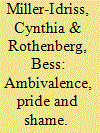

|
|
|
|
|
| Publication |
2012.
|
| Summary/Abstract |
This article examines complex everyday expressions and understandings of nationhood in Germany, focusing on citizens' articulations of national pride and their relationship with the nation. Through an analysis of ninety semi-structured interviews with 'ordinary' Germans conducted between 2000 and 2002, we argue that the prevailing, elite-centred approach to studying nationhood has not adequately captured the complex relationships that individuals have to the nation. We examine how individuals actively process and interpret nationhood in ways that reveal ambivalence, confusion and contradictory emotions towards the nation. Such individual variation is not neatly captured by official, elite, public or institutional presentations of the nation. We argue for further research on everyday understandings of nationhood and on ordinary people's views on national pride and national identity.
|
|
|
|
|
|
|
|
|
|
|
|
|
|
|
|
| 2 |
ID:
086961
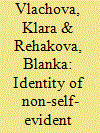

|
|
|
|
|
| Publication |
2009.
|
| Summary/Abstract |
In this study the authors analyse Czech national identity after the break-up of Czechoslovakia and before accession to the European Union. National identity is understood here as a construct consisting of several elements, four of which the authors analyse: territorial identity (localism, regionalism, patriotism, and Europeanism), the image of the nation - the cultural nation (ethno-nation) and the political nation (state-nation), national pride (in general, and in cultural performance and in the performance of the state), and love for the nation - nationalism (or more precisely, chauvinism) and patriotism. To create a more complex picture of Czech national identity the authors compare it with national identities in eleven other European countries. To conclude, the authors analyse the attitudes of Czechs toward the European Union, and national identity is used as an important explanatory element of the support for EU governance.
|
|
|
|
|
|
|
|
|
|
|
|
|
|
|
|
| 3 |
ID:
179560
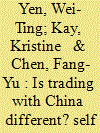

|
|
|
|
|
| Summary/Abstract |
Despite increasing economic integrations with China, worries exist in China's neighboring countries about China's implicit political intention. Do people view trading with China differently? In this article, we incorporate the political context of trade agreements by showing that trade with partners who come with political costs is less likely to be supported. Using a nationally representative survey experiment from Taiwan, we find that trading with China garners less support than trading with Japan or Malaysia, and nationalism suppresses self-interest when the proposed trading partner is China. We show that national attachment, which is neither a proxy for political identification nor a proxy for national chauvinism, becomes a stronger predictor of trade preferences toward China. While the political tension between China and Taiwan is unique, many countries see at least one other country posing a negative externality. Our finding suggests strongly identified nationalists would oppose engaging with a hostile outsider regardless of their self-interest.
|
|
|
|
|
|
|
|
|
|
|
|
|
|
|
|
| 4 |
ID:
185328
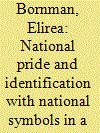

|
|
|
|
|
| Summary/Abstract |
The article investigates national pride, identification with national symbols and predictors of national pride some 20 years after South Africa’s political transformation. The results of a questionnaire survey involving a countrywide probability sample of 3 608 respondents are compared with those of a 1998 study. Compared to the 1998 study, there was a decline in national pride, while identification with national symbols increased. Particularly noteworthy were increases among Afrikaans-speaking Whites who dis-identified with national symbols in 1998. Significant group differences were found for all variables and group membership was indicated as the most important predictor of national pride. The national anthem was the most important symbol predicting national pride. Indications are that symbols reflecting various cultural legacies have a better chance of being widely accepted in heterogeneous societies.
|
|
|
|
|
|
|
|
|
|
|
|
|
|
|
|
| 5 |
ID:
157196
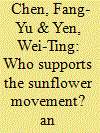

|
|
|
|
|
| Summary/Abstract |
The Sunflower Movement—an occupation of the Legislative Yuan (the Congress) for 24 days—was an unprecedented moment in the history of Taiwan. We examine the social foundation of the Movement and explore an important factor that has long been missing in the literature of Taiwanese politics: nationalism. We divide nationalism into three dimensions: national attachment, national chauvinism, and feelings toward other countries. Using original survey data collected six months after the Movement, we find that national attachment (being proud of Taiwan) and anti-China feelings are unique dimensions and both lead to a higher level of support for the Sunflower Movement. National chauvinism, on the other hand, is not associated with supports for the Movement. Furthermore, the impact of nationalism is contingent on sociotropic views. People who express higher levels of nationalism are more responsive to the issue of rising income inequality when evaluating the Movement. The underlying logic is when people are more nationalistic they care more about the potential social impact of expanding socio-economic exchanges with another country. These results point to it being necessary to disentangle various components of nationalism and further investigate their effects on individuals’ political behaviors.
|
|
|
|
|
|
|
|
|
|
|
|
|
|
|
|
| 6 |
ID:
153231
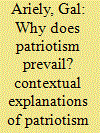

|
|
|
|
|
| Summary/Abstract |
Addressing the normative and empirical debate regarding the nature of patriotism, this paper examines the social contexts in which patriotism – defined here as an expression of national pride – thrives. Combining diverse theoretical explanations, it investigates whether expressions of patriotism are related to globalization, state function, social fractionalization and conflict. A multilevel regression analysis of data from 93 countries led to three principal findings. First, citizens of more developed and globalized countries are less likely to be proud of their country. Second, citizens are more likely to be patriotic in countries characterized by higher levels of income inequality and religiously homogeneity. Third, citizens of countries exposed to direct conflict – that is, suffering terror and causalities from external conflict – tend to exhibit higher levels of national pride. Patriotism frequently being identified as a mandatory political commodity, these results suggest that, overall, patriotism forms part of a less attractive matrix than its advocates tend to assume.
|
|
|
|
|
|
|
|
|
|
|
|
|
|
|
|
|
|
|
|
|